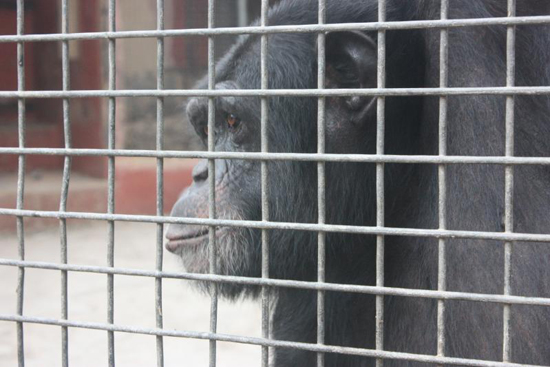Should Chimps Have the Rights of People?
LAW alum says they deserve legal personhood

Wrongly imprisoned? Attorney Steven Wise (LAW’76) wants courts to grant legal personhood to captive chimpanzees to free them. Photo by Kevin McCoy
When animal researchers decry the use of chimpanzees for medical research, even those least attentive to animal welfare might perk up. In June the National Institutes of Health announced an end to funding for biomedical research on chimps, adding that it would safely retire most of its lab-held specimens. The decision was partly pragmatic—scientists said the animals are not essential to most research—but it also reflected a humanitarian concern, expressed by the NIH director: “Chimpanzees are special creatures,” with “similarities to ourselves that are quite breathtaking.”
The NIH decision is nothing compared to what Steven Wise has in mind. Wise (LAW’76) has been appalled by humans’ treatment of animals for decades. He plans to file a habeas corpus suit this fall against an as-yet-unidentified party on behalf of a captive chimpanzee, arguing that the ape should be released on grounds that it deserves legal personhood.
Whatever the legal outcome for Chimp Doe, the Boston Globe, reporting recently on Wise’s crusade, says his argument is not that radical, noting that corporations and ships have received personhood status for the purpose of suits over the centuries. (Early American courts deemed ships people to expedite settlement of shipping accidents in which the vessel’s owner was absentee, the Globe said.) Farm animals, represented by lawyers, were tried (and occasionally acquitted) before medieval courts for killing people or destroying crops, the paper reported. But in the modern United States, the law considers them property, a designation Wise challenged for some animals in his books Rattling the Cage and Drawing the Line.

The upcoming suit will mark the first nonhuman client for the Florida-based Nonhuman Rights Project, of which Wise (right) is president. It builds on public debate over animal treatment in both research labs and industrial food farms, fed by graphic undercover videos and media reports. (Even The American Conservative magazine, cofounded by Pat Buchanan, savaged food production’s animal practices in a 2005 article by a former George W. Bush speechwriter.)
Wise has taught animal rights courses at several law schools. He discussed his coming litigation with BU Today.
BU Today: This suit will involve a chimpanzee. Based on the latest animal cognition science, which other species merit legal personhood?
Wise: There are a million species of animals. I have studied fewer than a dozen. Based on my research and discussions with scientists, it appears likely that at least some great apes, cetaceans, and elephants possess cognitive abilities that the Nonhuman Rights Project believes are sufficient for legal personhood. This is not meant to be a comprehensive list.
What do you say to those who worry that legal personhood for some animals might curb lifesaving medical research? Would it be legally tenable to confer some rights to animals while still permitting them to be used in such research?
Whether medical research is lifesaving is not the criterion for determining whether an entity should be recognized as a legal person, with such fundamental legal rights as bodily liberty and bodily integrity, or whether she should be used as the subject of biomedical research. If it were, we would use human beings in biomedical research against their will. Rather, we look at the nature of the subject and whether she has the legal right not to be used.
Any being eligible for legal personhood and such fundamental legal rights as bodily liberty and bodily integrity may not be used in ways that disrespect their rights. A good rule of thumb is that a nonhuman animal possessed of fundamental legal rights may be used in biomedical research in the same way in which a human child may be used, with similar safeguards. Chimpanzees are so extraordinarily autonomous and intelligent that they should not be used in biomedical research or otherwise imprisoned, used, or exploited, except as would a human child. The 2011 Institute of Medicine report and the 2013 actions of the National Institutes of Health, halting the funding of biomedical research on chimpanzees and sending more than 80 percent of them to sanctuaries, are a clear signal that their moral and legal statuses are rapidly changing.
If personhood required releasing animals from captivity, might that expose some species to extinction or near-extinction, as one zoo spokesman told the Boston Globe?
Legal personhood and fundamental legal rights for any animal require that we respect their individual legal rights and act solely in their interests, and not in ours. What that requires will depend upon individual circumstances.
If I recall your books correctly, states exempt animal husbandry from their animal cruelty laws. If your suit prevails, would factory farming become illegal?
No. Our lawsuits have nothing to do with factory farming or with anticruelty laws.
Haven’t courts rejected previous efforts to remove animals from the realm of property? If your suit fails, would there be alternative ways to protect them from mistreatment?
To my knowledge, our upcoming fall lawsuit will be the first in history to demand that a nonhuman animal be declared a legal person with a legal right. We do not plan to file one lawsuit. This upcoming lawsuit will be the first salvo of an open-ended, complex strategic litigation campaign in which we will file as many lawsuits as we can financially support throughout the United States.
Comments & Discussion
Boston University moderates comments to facilitate an informed, substantive, civil conversation. Abusive, profane, self-promotional, misleading, incoherent or off-topic comments will be rejected. Moderators are staffed during regular business hours (EST) and can only accept comments written in English. Statistics or facts must include a citation or a link to the citation.